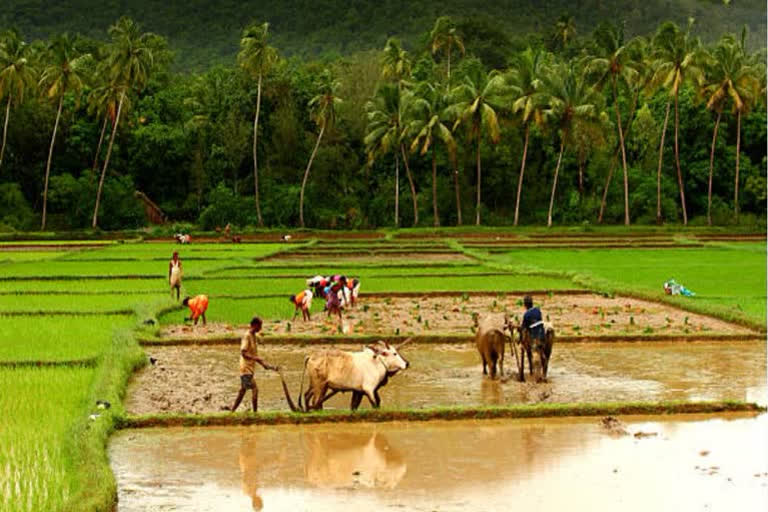New Delhi: The Union Cabinet on Wednesday approved to make the Pradhan Mantri Fasal Bima Yojana (PMFBY) voluntary for farmers, Agriculture Minister Narendra Singh Tomar said.
Addressing the media here, Tomar said that the decision was taken in the Cabinet meeting following complaints regarding the scheme launched in April 2016.
PMFBY is compulsory for farmers availing of crop loans and Kisan Credit Cards (KCCs) accounts for notified crops, while it is voluntary for others.
The scheme provides comprehensive crop insurance from pre-sowing to the post-harvest period against non-preventable natural risks at an extremely low premium of 2 per cent for kharif crops, 1.5 per cent for rabi crops, and 5 per cent for horticulture and commercial crops.
The decision at the Cabinet meeting, chaired by Prime Minister Narendra Modi, will lead to the revamp of PMFBY and Restructured Weather Based Crop Insurance Scheme (RWBCIS) to address the existing challenges in the implementation of crop insurance schemes.
It is proposed to modify certain parameters and provisions of the ongoing schemes of PMFBY and RWBCIS under which allocation of business to insurance companies will be done for three years.
"Options will be given to the states and Union Territories to choose the scale of finance or district-level Value of Notional Average Yield (NAY), that is NAY Minimum Support Price (MSP), as sum insured for any district crop combination (both PMFBY and RWBCIS). Farm gate price will be considered for the other crops for which MSP is not declared," a Cabinet statement said.
The central subsidy under PMFBY and RWBCIS is to be limited for premium rates up to 30 per cent for unirrigated areas or crops and 25 per cent for irrigated areas. Crops and districts having 50 per cent or more irrigated area will be considered as irrigated areas or districts.
There would be flexibility for the states and Union Territories to implement the scheme with an option to select any or many of additional risk covers or features like prevented sowing, localised calamity, mid-season adversity, and post-harvest losses, the statement said.
Further, the states and UTs can offer specific single-peril risk or insurance covers, like hailstorm, under the PMFBY even with or without opting for base cover (both PMFBY and RWBCIS).
States will not be allowed to implement the scheme in subsequent seasons in case of considerable delay by them in the release of requisite premium subsidy to insurance companies concerned beyond a prescribed time limit.
Cut-off dates for invoking this provision for Kharif and Rabi seasons will be March 31 and September 30 of successive years respectively for both PMFBY and RWBCIS, the Agriculture Minister said.
"For estimation of crop losses or admissible claims, two-step process is to be adopted based on 'defined deviation matrix' using specific triggers like weather indicators, satellite indicators, for each area along with normal ranges and deviation ranges. Only areas with deviations will be subject to Crop Cutting Experiments (CCEs) for assessment of yield loss (PMFBY)," said the Minister.
In case of non-provision of yield data beyond cut-off date by the states to insurance companies, claims are to be settled based on yield arrived through use of Technology solution (PMFBY alone).
Enrolment under the scheme is to be made voluntary for all farmers in both PMFBY and RWBCIS and the central share in premium subsidy is to be increased to 90 per cent for northeastern states from the existing sharing pattern of 50:50.
Provisioning of at least 3 per cent of the total allocation for the scheme is to be made by the Centre and implementing state governments for administrative expenses.
This shall be subject to an upper cap fixed by DAC&FW Dipartment of the Agriculture Ministry for each state for both PMFBY and RWBCIS.
Besides, the Department of Agriculture, Cooperation and Farmers Welfare (DAC&FW) in consultation with other stakeholders and agencies will prepare and develop state-specific alternative risk mitigation programme for crops and areas having a high rate of premium.
"As the scheme is being made voluntary for all farmers, therefore, to provide financial support and effective risk mitigation tools through crop insurance, especially to 151 districts that are highly water stressed (including 29 doubly stressed because of low farmers income and drought), a separate scheme would be prepared," the Minister said.
The provisions and parameters of the scheme and operational guidelines of the PMFBY and RWBCIS shall be modified to incorporate the above said modifications and shall be made operational from Kharif 2020 season, he said.
These changes are expected to help farmers manage the risk in agriculture production in a better way and succeed in stabilising farm incomes and increase coverage in the northeastern region.
"These changes will enable quick and accurate yield estimation, leading to faster claims settlement. These changes are proposed to be implemented from Kharif' 2020 season throughout the country."
IANS Report
Also Read: Cabinet okays Bill to protect women's reproductive rights



